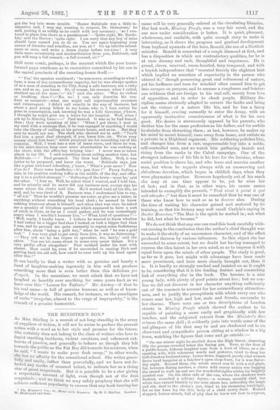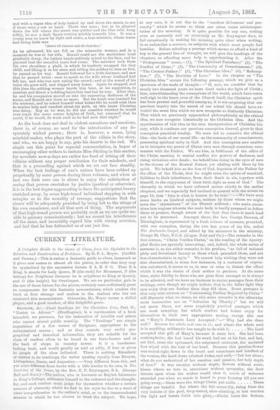THE MINISTER'S SON.* As Miss Stirling is a recruit of
not long standilig in the army Of suppliers of fiction, it will not be amiss to preface the present notice with a word as to her style and promise for the future. She certainly does not belong to the class of writers who love to .depict startling incidents, violent emotions, and vehement out- bursts of passion, and generally to behave as though they felt towards the public as the Fat Boy did towards his mistress, when he said, "I wants to make your flesh creep ;" in other words, she has no affinity for the sensational school. She writes grace- fully and easily, rather than powerfully, and we have not de- tected any marks of unusual talent, to indicate her as a rising star of great magnitude. But it is possible to be a star giving a respectable amount of light, even though not of the first magnitude ; and we think we may safely prophesy that she will achieve sufficient _po_itil_ar_it_y_t_o ensure that any book bearing her
* The Ministry's ; or, Home trim Honours. By M. C. Stirling. ---10L1UZU--;
Vf. Blackwood and Sons.
name will be very generally ordered at the circulating libraries. Her last work, Missing Proofs, was a very fair novel, and the one now under consideration is better. It is quiet, pleasant, wholesome, and readable, with quite enough story to make it interesting, as it shows the progress and gradual development from boyhood upwards of the hero, Ronald, the son of a Scottish minister. Ronald is somewhat of a rough diamond at first, and has a disposition in which are contradictory qualities, for he is at once dreamy and rash, thoughtful and impetuous. He is proud, clever, reserved, warm-hearted, fiery-tempered, and with a boyish independence that "resented fiercely the slightest hint
which implied an assertion of superiority in the person who uttered it ;" though possessing great real refinement of nature, yet his huffiness and turn for mischief often caused him to get into scrapes on purpose, and to assume a roughness and boister- ous wildness that are foreign to his real self, merely from love of opposition, and in order to shock people. Military dis- cipline seems obviously adapted to correct the faults and bring out the virtues of a nature like his, and he has a fancy for it himself, craving earnestly to enter the Army, with an apparently instinctive consciousness of what is for his own good. His desire is etrenuously opposed by his parents, who destine him for the same profession as his father, and for awhile he shrinks from thwarting them ; at last, however, he makes up his mind to assert himself, runs away from home, and enlists as a private in a Highland regiment. His soldiering polishes him, and changes him from a raw, ungovernable boy into a noble, self-controlled man, and we watch him gathering laurels and rising from the ranks in the Cahill campaign. One of the
strongest influences of his life is his love for the heroine, whose social position is above his, and who loves and marries another man, but whom he regards always with an unswerving and chivalrous devotion, which began in childish days, when they were playmates together. However hopelessly out of his reach she may at one time appear to be, yet he wins her at last ; and in that, as in other ways, his career seems intended to exemplify the proverb, " Tout vient a point a qui sait attendre ;" but then it must be remarked that he was one of those who know how to wait so as to deserve also. During the time of waiting his character gained and matured by its training, so that his history may well recall Carlyle's saying in Sc,-tor Resartus," The Man is the spirit he worked in ; not what he did, but what he became."
We do not think that any one can read this book carefully with- out coining to the conclusion that the author's chief thought was to make it the study of an uncommon character, and of the effect produced thereon by various influences. In this object she has succeeded to some extent, but we doubt her having managed to express the idea latent in her own mind, so as to impress it with equal force upon the minds of other people. The study is good, as far as it goes, but might with advantage have been made more prominent, and been more clearly brought out, than it is. It is hardly as strongly marked and insisted on as it ought to be, considering that it is the leading feature and connecting link of everything else in the book. The heroine is a nice young lady, with plenty of good points about her ; but we con-
fess we did not discover in her character anything sufficiently out of the common to account for her extraordinary attractive- ness, and to justify the promptitude with which every one who comes near her, high and low, male and female, succumbs to her charms. There were one or two descriptions of London streets in Missing Proofs which showed the author to be capable of painting a scene easily and graphically with few touches, and the subjoined extract from the Minister's Son
evinces the same skill ; it evidently puts into words some of the sad glimpses of life that may be and are shadowed out to an observant and sympathetic person sitting at a window in a big town, watching the figures that come and go outside :—
"On one winter night be strolled down the High Street, observing idly the groups crowded below the flaring gas. Here, at the door of a peblic-house, hideous laughter rose from a knot of idlers, as a de- spairing wife, with vehement words and gestures, tried to drag her half-drunken husband away. Lower down, haggard, poorly-dad women drove herd bargains at a butcher's open shop-front, for it was Satur- day night. Beyond these, the whole street was lit with a red glare, for, between flaring torches, a clown with merry antics was begging the crowd to walk up and see the wonderful sights within his brightly painted van. On the other side of the van, where the shadows were darkest, crouched a solitary figure,—a woman, scantily clad, her white face turned blankly to the mist above her, unheeding the laugh and stir, deaf to the clown's jest, blind to his streaming torchlight, for on her knee lay the thin body of a child newly dead. Ronald stopped, horror-struck, full of pity that he knew not how to express,
and with a vague idea of help looked up and down the street, to sea if there were a cab at hand. There was none; but as he glanced down the bill where the street was quieter and the blue mist hung softly, he saw a dark figure coming quickly towards him. It was a young man he knew by sight and name, a true minister, whose warm and living faith was
'Above all chances and all churches.'
As he advanced, his eye fell on the miserable woman, and in a moment he was at her side. Ronald could see the motionless hoed gradually droop, the listless hands suddenly raised to the face, and he guessed that the merciful tears had come. The minister took • from his own shoulders a plaid, in which he tenderly wrapped the tiny child, and lifting it in his arms and telling the mother to lean on him, he passed on his way. Ronald followed for a little distance, and saw that he paused twice : once to speak to the wife whose husband had left her, and who was now rating the crowd ; and at the sound of his voice she grew still, and slipped away home. Again he stopped, and this time the sobbing woman beside him bent, at his suggestion, to comfort and direct a toddling bairn that had lost its way. After that, he and his companion moved on into the narrowing darkness of the street, and Ronald saw them no more. But his heart was touohed for the moment, and be asked himself what better life he could wish than to scatter help and comfort about his path, as this brave Christian was doing. Boy as he was, he did not consider whether he would ever reach the same serene heights of faith, but assumed that he could, if he would, do work such as he had seen that night."
As the book does not deal in violent sensations and emotions,
there is, of course, no need for the introduction of any de- sperately wicked person ; there is, however, a mean, lying mischief-maker, who plays the part of the villain in the story, and who, we are happy to say, gets his deserts in the end. We single out this point for especial commendation, in hopes of encouraging other writers to imitate Miss Stirling in this matter, for novelists now-a-days are rather too fond of letting off their villains without any proper retribution for their misdeeds, and that is a proceeding against which we set our face steadily. When the best feelings of one's nature have been rubbed up perpetually by some person during three volumes, and when at last one feels sure one is about to enjoy the satisfaction of seeing that person overtaken by justice (poetical or otherwise), it is in the last degree aggravating to have the anticipated luxury snatched away, by some high-toned individual stepping in with scruples as to the morality of revenge, suggestions that the sinner will be adequately punished 'by being left to the stings of his own conscience, and all that sort of thing. The arguments of that high-toned person are probably such as we are quite un- able to gainsay conscientiously ; but we resent his interference all the same, and invariably regard him with strong aversion, and feel that he has defrauded us of our just due.































 Previous page
Previous page